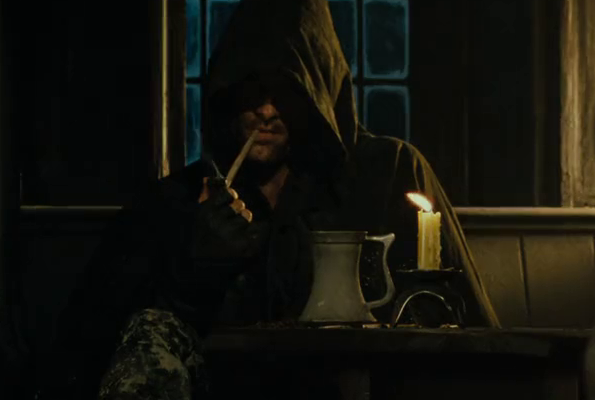Fear of the inner alpha, as reflected in the menace associated with the Strider character in The Fellowship of the Ring, the same man that is later so fawningly accepted as a savior when his bloodline is revealed as having been anointed by the hierarchy, is a concept that my friend Bob queried me on as he drove me down to Salt Lake City out of the mountains one autumn night. I have reflected upon this dichotomy placed so prominently in Tolkien’s essentially dissident fantasy narrative as travels have taken me east from a feared place filled with good to the cozy media place I came from, so filled with evil as it is. I am still encountering people living in the most deadly 12 by 12 miles in America who react with horror that I have the courage to face the gun-toting “white people” of Inner America.
It occurs now, that since the only evil beast permitted in the current mythology is the blood-hungry “Whiteman,” who like “that Strider, a Ranger out of the wild,” decline to live in physically easy moral squalor are deeply feared by the common meat-puppet, that he and his cucked version, Aragorn, make for an excellent set or archetypes for today’s world. The alpha and the omega men have always been so much closer to one another—even though they be each other’s opposite—than they are to the beta herd.
From Gilgamesh and Enkidu to, Daniel Boone and Simon Kenton, Wyatt Earp and Doc Holiday, the omega or taboo man, has always been the closest ally to the alpha male. There is also the fact, that in many cases, when there is no alpha male to take on the leadership role, that it is thrust upon the omega loner type. Indeed, a common motif in modern and postmodern action movies is the reluctant hero, who has to be coaxed or shamed or angered in some way to lay his life on the line for all those inferior beta meat-puppets. This is the theme in perhaps half of Clint Eastwood’s movies.

Tolkien was brilliant enough to place this dichotomy of alienation—for the true leader type become as alienated from those he leads as the loner does from those he leaves. In the absence of a true leader type, the perspective and detachment of the loner can form a basis for conditional leadership. However, as a loner who took on such a role for four years, I can tell you that it is a soul-eating proposition for one lacking the desire to dominate others, which is the clutch difference between the two types of personality.
The alpha’s desire to dominate the herd and the loner’s desire to separate from the herd, negatively affect these leaders of those who they detest. These perspectives define the method of their moral corruption and personal corrosion, by which power, a corrupting force, dissolves the wielder of the tool. Tolkien then ingeniously replaces the alienated perspective of Strider—when he becomes known for a royal scion—with the alienated perspective of the hobbit or halfling among men, which is to say a person who is still childlike in their soul. This was a hold over from the Hobbit story in which the childlike hobbit was employed as a protagonist to appeal to child readers. So, where the alpha is corrupted by power, the omega is driven by madness into the shallows of self-doubt, the most miserable body of experience in which to drown.
Keeping with movies as a talking point, it occurs that perhaps the slasher flick, the suburban horror film, with it loner villain, lack of alpha leadership and leadership of beta males and alpha females, in which the body of the people is all or nearly all slaughtered in horrible wise, represents a subliminal rejection of the managerial hierarchy of Modernity, a hierarchy based on elevation of beta puppets to system figurehead. This also seems to be the subtext of most action hero movies in postmodern film, with savage killers such as Daniel Craig’s James Bond, Jason Bourne, every protagonist played by Clive Owen and Jason Statham, and many others, also represent loners—most starkly depicted in the revenge movie Polar—at odds with brutally managed subsystems of the managerial matrix.
If I were writing the Lord of the Rings, Strider and the rangers would have formed an exodus party, stolen the elvish ships, and left the degenerate elder races, the over-domesticated hobbits, the slobs at the Brandywine Tavern and the Stewards of Gondor to be reaped by the most highly evolved form of their own kind—the soulless dark lord and his minions. Such systems thrive so long as they might, only due to their success in roping in alpha and omega males to slave as overseers and assassins, seduced by the promise of the preservation of their warrior function in service to the reduction of warrior ethics, and ultimately their extinction.

James is a full-time writer, part-time coach and part-time wage slave with an extensive history of brain trauma. Check out: http://www.jameslafond.com/




A willingness to question yourself and your fitness isn’t a weakness. A good king is a servant first, as an avatar of the nation (his people).
Aragorn did nothing wrong, and was there when his people needed him.
We should be so fortunate.